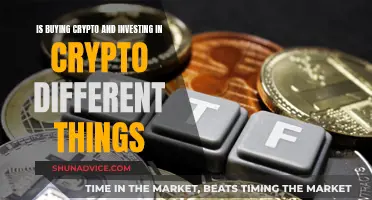
The world of cryptocurrencies is complex and full of jargon, acronyms, and slang. There are several terms used to refer to people who invest in crypto, including hodlers, whales, bitcoiners, altcoiners, and no-coiners. Hodler is derived from a misspelling of hold in a 2013 online post, and refers to someone who buys and holds a coin for the long term, regardless of market volatility. A whale is someone who owns a large amount of cryptocurrency and has the potential to manipulate market prices. A bitcoiner is someone who only invests in Bitcoin, while an altcoiner explores and invests in other cryptocurrencies. Conversely, a no-coiner is someone who does not hold any cryptocurrencies and is highly critical of the asset class.
| Characteristics | Values |
|---|---|
| Crypto-curious | Someone who has expressed interest in investing in crypto but has yet to try |
| Crypto-native | Someone who has been investing in crypto for a long time and could be moderately or extremely wealthy |
| Crypto investor | Someone who has already started investing in crypto on their own |
| Bitcoiner | Someone who only invests in bitcoin, with little to no interest in other cryptocurrencies |
| Altcoiner | Someone who loves exploring cryptocurrencies other than bitcoin and invests heavily in altcoins |
| Cryptosis | Someone who strives to absorb every bit of information about crypto and won’t stop talking about it |
| Whale | A person or entity owning large amounts of a certain cryptocurrency |
| Bear whale | A whale trader who is bearish on the market and believes prices will fall |
What You'll Learn
- Crypto-curious: an investor who is interested in crypto but has yet to try it
- Crypto native: a long-time crypto investor who may be moderately or extremely wealthy
- Bitcoin maximalists: investors who believe Bitcoin is the only cryptocurrency of value
- Altcoiners: those who explore and invest in cryptocurrencies other than Bitcoin
- No-coiners: people who are highly critical of crypto and hold none

Crypto-curious: an investor who is interested in crypto but has yet to try it
The world of cryptocurrency can be daunting for newcomers, with its complex technical jargon, volatile market, and ever-evolving landscape. Those who are crypto-curious embody this sentiment—they are individuals who have expressed interest in investing in crypto but have not yet taken the plunge. This hesitation is not uncommon, as potential investors may have concerns about losing money or navigating the technology. Additionally, they may be waiting for guidance from a financial advisor before making their first move.
For financial advisors, understanding the crypto-curious client is essential. These clients will require education, starting with the technology underpinning cryptocurrencies. Conversations with these clients often begin with expressions of interest in crypto or stories of others' successes in the crypto market. Advisors must first understand their clients' motivations for considering crypto before imparting their knowledge. This approach ensures that the information provided aligns with the clients' needs and risk profiles.
When advising crypto-curious individuals, it is crucial to set expectations and develop strategies that match their financial goals and tolerance for risk. For instance, a client close to retirement age may seek to invest in Bitcoin as an inflation hedge. In this case, the advisor should explain the potential benefits of crypto in offsetting inflation while also discussing the volatility and risks associated with this type of investment.
By taking the time to educate and guide crypto-curious clients, financial advisors can add value to their services and foster stronger relationships with their clients. This approach can also lead to new revenue streams through project fees or assets under management (AUM). Ultimately, the decision to invest in crypto should be made with careful consideration, taking into account the client's unique circumstances and financial goals.
Bitcoin: The Ultimate Investment Choice
You may want to see also

Crypto native: a long-time crypto investor who may be moderately or extremely wealthy
Crypto Native: A Long-Time Crypto Investor
A crypto native is a long-time crypto investor who may be moderately or extremely wealthy. They have been investing in crypto for some time and could have a diverse portfolio of cryptocurrencies or a large position in a single token, such as Bitcoin. Crypto natives are sometimes referred to as "whales" due to their potential to influence market prices with their significant holdings.
Crypto natives may have been early adopters of Bitcoin or other cryptocurrencies, investing heavily in a few tokens or even contributing to the beginning of a protocol that launched a token. As a result, they could have accumulated substantial wealth through their crypto investments.
These investors have likely experienced the highs and lows of the volatile crypto market and have a good understanding of the risks and opportunities it presents. They may have a long-term investment horizon, employing a buy-and-hold strategy to weather the market's ups and downs.
Crypto natives are often averse to traditional financial advisors, fearing they will be steered away from crypto or that their investments won't be understood. However, as the crypto market matures and becomes more complex, these investors may seek financial advisors who are knowledgeable about digital assets to help them navigate the unique challenges and opportunities presented by their crypto holdings.
By understanding the specific needs and goals of crypto natives, financial advisors can better serve this growing client base, providing valuable insights and strategies to manage their crypto investments effectively.
Etoro's Dogecoin Investment: Is It Worth Your Money?
You may want to see also

Bitcoin maximalists: investors who believe Bitcoin is the only cryptocurrency of value
Bitcoin maximalists are investors who believe that Bitcoin is the only cryptocurrency of value. They think that other cryptocurrencies are inferior to Bitcoin and do not align with the ideals established by its creator, Satoshi Nakamoto. Maximalists argue that Bitcoin is the only digital asset that will be needed in the future and that it has the most secure and decentralised network.
Bitcoin maximalism is the belief that Bitcoin, the world's most popular cryptocurrency, is the only digital asset necessary. Maximalists hold that the other cryptocurrencies, known as "altcoins", are unnecessary and inferior to Bitcoin. They argue that Bitcoin's blockchain network, which is decentralised and publicly distributed, is more secure and transparent than those of other coins.
The philosophy behind Bitcoin maximalism is based on a set of beliefs that have grown in popularity within the community. One of the most prominent principles is the security provided by the Bitcoin blockchain. The network has been running for over a decade without any major security breaches. Maximalists also believe in the decentralised nature of Bitcoin, meaning no single person or entity controls the blockchain, making it less prone to manipulation.
Another key principle is the idea that Bitcoin is the future of money. Maximalists consider Bitcoin the only currency that matters and predict that it will eventually replace fiat currencies. This is due to Bitcoin's fixed supply of 21 million coins, in contrast to fiat currencies, which can be printed at governments' discretion. Additionally, Bitcoin has the largest market capitalisation and a first-mover advantage.
Bitcoin maximalists also emphasise the pseudo-anonymity of Bitcoin, where users are not required to provide identification to own or participate in the blockchain. While the ledger is publicly viewable, the true identities of wallet holders are not revealed.
Furthermore, maximalists view Bitcoin as a viable payment method that is often cheaper than international wire transfers. They encourage individuals and businesses to use Bitcoin as payment to increase the network's activity and reach.
In conclusion, Bitcoin maximalists are a group of investors with a strong belief in the superiority of Bitcoin over all other cryptocurrencies. They base their arguments on the security, decentralisation, transparency, pseudo-anonymity, and viability of Bitcoin as a payment method. While they acknowledge the existence of other cryptocurrencies, they consider them unnecessary and predict that Bitcoin will ultimately render them ineffective.
Bitcoins: A Long-Term Investment Worth the Risk?
You may want to see also

Altcoiners: those who explore and invest in cryptocurrencies other than Bitcoin
The world of cryptocurrencies is complex and ever-changing, with new coins and tokens constantly entering the market. Among the many players in this space, there is a distinct group known as "altcoiners". So, what sets altcoiners apart from other crypto investors?
Well, as the name suggests, altcoiners are individuals who actively explore and invest in cryptocurrencies beyond the well-known Bitcoin. They venture into the realm of alternative coins, often referred to as "altcoins". This diverse group of cryptocurrencies offers a range of features, functionalities, and technologies that set them apart from Bitcoin.
For altcoiners, the appeal lies in the exploration and discovery of these new and emerging coins. They seek opportunities in cryptocurrencies that are making waves in the market, whether through innovative technologies, unique use cases, or promising roadmaps. Altcoiners are often early adopters, willing to take calculated risks on these alternative coins, believing in their potential for growth and success.
By diversifying their portfolios beyond Bitcoin, altcoiners aim to capitalise on the unique advantages offered by each altcoin. Some altcoins provide faster transaction speeds, lower fees, or more advanced smart contract capabilities. Others may focus on specific niches, such as privacy, decentralised finance (DeFi), or non-fungible tokens (NFTs). This exploration of altcoins allows investors to access a broader range of opportunities and potentially mitigate the risks associated with a single cryptocurrency.
However, it's important to note that investing in altcoins also comes with its own set of risks. The cryptocurrency market is highly volatile, and altcoins can be even more unpredictable than more established coins like Bitcoin. Altcoiners need to be diligent in their research, understanding the technology, team, and community behind each coin to make informed investment decisions.
In conclusion, altcoiners are adventurous crypto enthusiasts who embrace the vast array of cryptocurrencies beyond Bitcoin. They navigate the dynamic landscape of altcoins, seeking opportunities for growth, innovation, and diversification. While this strategy can be rewarding, it also requires a thorough understanding of the market and the ability to manage risks effectively. Altcoiners play a crucial role in the evolution of the cryptocurrency ecosystem, driving forward the exploration and adoption of new coins and technologies.
The Ultimate Guide to Investing in Bitcoins
You may want to see also

No-coiners: people who are highly critical of crypto and hold none
No-coiners are individuals who are highly critical of cryptocurrencies and believe that they have little to no value. They are convinced that crypto is destined to fail and, therefore, do not hold any form of digital currency, be it Bitcoin (BTC), Ethereum (ETH), or any other cryptocurrency. This term is often used in a derogatory manner to describe those with a traditional mindset and limited knowledge of cryptocurrencies.
No-coiners' scepticism towards crypto can be attributed to various factors. Firstly, they may consider cryptocurrencies to be highly unstable and risky investments due to their price volatility. The crypto market is known for its rapid surges and crashes, leading many people to view cryptocurrencies as speculative bubbles. Secondly, no-coiners might be concerned about the high energy consumption associated with mining activities, especially given the unpredictability of mining. The concentration of mining among large firms with substantial energy requirements has raised environmental concerns.
Additionally, the technical complexity of using and storing crypto assets cannot be overlooked. The process of acquiring, storing, and transacting with cryptocurrencies can be daunting for newcomers, and the risk of losing one's investment due to incorrect transactions or lost passwords is significant. No-coiners may also be apprehensive about the criminal activities associated with cryptocurrencies, including money laundering, illicit purchases, and ransomware.
Furthermore, no-coiners might argue that cryptocurrencies have become highly centralized, contradicting the initial promise of a decentralized system. The wealth distribution in cryptocurrencies has become concentrated among companies and investment fund managers, which goes against the intended democratization of finance. Lastly, the lack of coherent regulations and the unclear legal status of cryptocurrencies in various jurisdictions contribute to the scepticism of no-coiners, who view the potential for regulatory intervention as a significant risk factor.
In conclusion, the term "no-coiner" describes individuals who are highly sceptical of the value and longevity of cryptocurrencies. Their criticism stems from concerns about price volatility, environmental impact, technical complexities, criminal activities, centralization, and regulatory uncertainties. While no-coiners choose to stay away from investing in crypto, their perspective highlights the perceived risks and challenges associated with this relatively new and evolving digital asset class.
The Pros and Cons of Investing in Bitcoin Mining
You may want to see also







